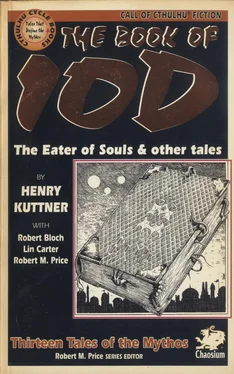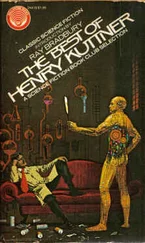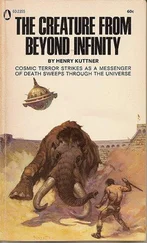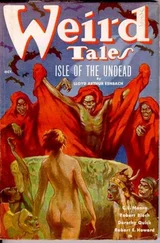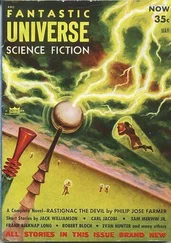Henry Kuttner - The Book of Iod
Здесь есть возможность читать онлайн «Henry Kuttner - The Book of Iod» весь текст электронной книги совершенно бесплатно (целиком полную версию без сокращений). В некоторых случаях можно слушать аудио, скачать через торрент в формате fb2 и присутствует краткое содержание. Год выпуска: 1995, ISBN: 1995, Издательство: Chaosium, Жанр: Ужасы и Мистика, на английском языке. Описание произведения, (предисловие) а так же отзывы посетителей доступны на портале библиотеки ЛибКат.
- Название:The Book of Iod
- Автор:
- Издательство:Chaosium
- Жанр:
- Год:1995
- ISBN:9781568820453
- Рейтинг книги:5 / 5. Голосов: 1
-
Избранное:Добавить в избранное
- Отзывы:
-
Ваша оценка:
- 100
- 1
- 2
- 3
- 4
- 5
The Book of Iod: краткое содержание, описание и аннотация
Предлагаем к чтению аннотацию, описание, краткое содержание или предисловие (зависит от того, что написал сам автор книги «The Book of Iod»). Если вы не нашли необходимую информацию о книге — напишите в комментариях, мы постараемся отыскать её.
The Book of Iod — читать онлайн бесплатно полную книгу (весь текст) целиком
Ниже представлен текст книги, разбитый по страницам. Система сохранения места последней прочитанной страницы, позволяет с удобством читать онлайн бесплатно книгу «The Book of Iod», без необходимости каждый раз заново искать на чём Вы остановились. Поставьте закладку, и сможете в любой момент перейти на страницу, на которой закончили чтение.
Интервал:
Закладка:
It was ghastly for Dean to see himself reflected where no mirror existed; ghastlier still to see that in his face there no longer were his eyes. The sly, mocking stare of the sea-creature peered out at him from behind their fleshy mask, and they were ancient, evil. The pseudo-human snarled at him and tried to dodge off into the darkness. Dean followed, on all fours.
He knew what he must do. That sea-thing—Morelia—she had taken his body during that last black kiss, just as he had been forced into hers, but she had not yet recovered enough to go out into the world. That was why he had found her still in the cave. Now, however, she would leave, and his uncle Michael would never know. The world would never know, either, what horror stalked its surface—until it was too late. Dean, his own tragic form hateful to him now, knew what he must do.
Purposefully he maneuvered the mocking body of himself into a rocky corner. There was a look of fright in those gelid eyes—
A sound caused Dean to turn, pivoting his reptilian neck. Through glazed fish-eyes he saw the faces of Michael Leigh and Doctor Yamada. Torches in hand, they were entering the cave.
Dean knew what they would do, and he no longer cared. He closed in on the human body that housed the soul of the sea-beast; closed in with the beast’s own flailing flippers; seized it in its own arms and menaced it with its own teeth near the creature’s white, human neck.
From behind him he heard shouts and cries at his very back, but Dean did not care. He had a duty to perform, an atonement. Through the corner of his eye, he saw the barrel of a revolver as it glinted in Yamada's hand.
Then came two bursts of stabbing flame and the oblivion Dean craved. But he died happy, for he had atoned for the black kiss.
Even as he sank into death, Graham Dean had bitten with animal fangs into his own throat, and his heart was filled with peace as, dying, he saw himself die—
His soul mingled in the third black kiss of Death.
The Jest of Droom-avista by Henry Kuttner
This story is finally little more than a conventional “you can’t win in a deal with the devil” story, but it has a few points of interest vis-a-vis the Kuttner Mythos and its development. For one, Droom-avista would seem to be the prototype of Zuchequon in the later “Bells of Honor.” The first is called the Dark Shining One, the second the Dark Silent One. The advent of each is signaled by a veil of eldritch shadow. I have already suggested that “Bells of Horror” owes a debt to Lovecrafis “The Haunter of the Dark.” Another clue to this conclusion is this epithet, “the Dark Shining One”, which combines both the notions of the Shining Trapezohedron and the Haunter of the Dark.
As for the name Droom-avista, here we see a bit of Zoroastrian influence. “Avista” is plainly derived from the title of the Zoroastrian scripture, the Avesta. In older works on Zoroastrianism this scripture was often called the Zend Avesta, because of the unique Zend language in which it is written. Kuttner has appropriated this term, too: it appears as the name of the sorcerer Zend in “Spawn of Dagon.”
First publication: Weird Tales, August 1937.
There is a tale they tell of voices that called eerily by night in the marble streets of long-fallen Bel Yarnak, saying: “Evil is come to the land; doom falls on the fair city where our children’s children walk. Woe, woe unto Bel Yarnak.” Then did the dwellers in the city gather affrightedly in huddled groups, casting furtive glances at the Black Minaret that spears up gigantically from the temple gardens; for, as all men know, when doom comes to Bel Yarnak, the Black Minaret will play its part in that dreadful Ragnarok.
Woe, woe unto Bel Yarnak! Fallen forever are the shining silver towers, lost the magic, soiled the glamor. For stealthily and by night, under the triple moons that hurtle swiftly across the velvet sky, doom crept out inexorably from the Black Minaret.
Mighty magicians were the priests of the Black Minaret. Mighty were they, alchemists and sorcerers, and always they sought the Stone of the Philosophers, that strange power which would enable them to transmute all things into the rarest of metals. And in a vault far below the temple gardens, toiling endlessly at glittering alembics and shining crucibles, lit by the violet glow of ocuru-lamps, stood Thorazor, mightiest of priests, wisest of all who dwelt in Bel Yarnak. Days and weeks and years he had toiled, while strange moons reeled down to the horizons, seeking the Elixir. Gold and silver paved the streets; blazing diamonds, moon-glowing opals, purple gems of strange fire, meteor-fallen, made of Bel Yarnak a splendid vision, shining by night to guide the weary traveler across the sandy wastes. But a rarer element Thorazor sought. Other worlds possessed it, for the intricate telescopes of the astronomers revealed its presence in the flaming suns that fill the chaotic sky, making night over Bel Yarnak a mirror reflecting the blazing scintillance of the city, a star-carpeted purple tapestry where the triple moons weave their arabesque patterns. So toiled Thorazor under the Black Minaret all of glistening jet onyx.
He failed, and again he failed, and at length he knew that only with the gods’ aid could he find the Elixir he sought. Not the little gods, nor the gods of good and evil, but Droom-avista, the Dweller Beyond, the Dark Shining One, Thorazor called up blasphemously from the abyss. For Thorazor’s brain was warped; he had toiled endlessly, and foiled as often; in his mind was but one thought. So he did that which is forbidden: He traced the Seven Circles and spoke the Name which wakens Droom-avista from his brooding sleep.
A shadow swept down, darkening over the Black Minaret. Yet Bel Yarnak was untroubled; glorious and beautiful the shining city glowed while thin voices called weirdly in the streets.
Woe, woe unto Bel Yarnak! For the shadow darkened and encompassed the Black Minaret, and midnight black closed ominously about the sorcerer Thorazor. All alone he stood in his chamber, no gleam of light relieving the awful darkness that heralded the coming of the Dark Shining One, and slowly, ponderously, there rose up before him a Shape. But Thorazor cried out and hid his eyes, for none may look upon the Dweller Beyond lest his soul be blasted forever.
Like the groaning tocsin of a Cyclopean bell came the voice of the Dweller, rumbling terribly under the Black Minaret. Yet only Thorazor heard it, for he alone had called up Droom-avista.
“Now my sleep is troubled,” the god cried. “Now my dreams are shattered and I must weave new visions. Many worlds, a mightier cosmos, have you ruined; yet there are other worlds and other dreams, and perchance I shall find amusement in this little planet. For is not one of my names the Jester?”
Shuddering and fearful, still hiding his eyes, Thorazor spoke.
“Great Droom-avista, I know your name; I have said it. By the doom even upon you, you must obey one command of him who calls you up.”
The darkness throbbed and pulsed. Ironically Droom-avista assented. “Command, then. O little fool, command your god! For always have men sought to enslave gods, and ever have they succeeded too well.”
Yet Thorazor heeded not the warning. One thought only had he: the Elixir, the mighty magic that would transmute all things into the rarest of elements, and to Droom-avista he spoke fearlessly. He said his desire.
"But is that all?” the god said slowly. “Now this is but a small thing for which to disturb my slumber. So shall I grant your desire—for am I not named the Jester? Do thus and thus.” And Droom-avista spoke of that which would transmute all things into the rarest of metals on Bel Yarnak.
Читать дальшеИнтервал:
Закладка:
Похожие книги на «The Book of Iod»
Представляем Вашему вниманию похожие книги на «The Book of Iod» списком для выбора. Мы отобрали схожую по названию и смыслу литературу в надежде предоставить читателям больше вариантов отыскать новые, интересные, ещё непрочитанные произведения.
Обсуждение, отзывы о книге «The Book of Iod» и просто собственные мнения читателей. Оставьте ваши комментарии, напишите, что Вы думаете о произведении, его смысле или главных героях. Укажите что конкретно понравилось, а что нет, и почему Вы так считаете.
